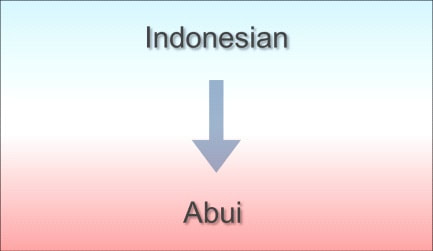Project
Case studies of contact-induced change
|
Exploring the difference between linguistic borrowing and inheritance...
|
Project 2: Transfer of words: Indonesian and Abui
Investigator: George Saad (PhD student)
P2 is one of the three case studies of language contact. It explores current contact between Indonesian (Austronesian) and Abui (Papuan) by studying the language spoken by bilingual Abui-Indonesian speakers today. It provides information on changes that are ongoing in a small Papuan language dominated by an influential Austronesian language.
The Indonesian spoken on Alor island has much in common with the Malay variety spoken in Kupang (Timor), a descendant of trade Malay which has been used in the area since pre-colonial times. Indonesia is home to over 700 languages, all of which are in contact with Indonesian, the national language used in the media, education system, law, and administration. However, to date no detailed study exists of ongoing processes of language negotiation and shift between Indonesian and one of the minority languages.
Investigator: George Saad (PhD student)
P2 is one of the three case studies of language contact. It explores current contact between Indonesian (Austronesian) and Abui (Papuan) by studying the language spoken by bilingual Abui-Indonesian speakers today. It provides information on changes that are ongoing in a small Papuan language dominated by an influential Austronesian language.
The Indonesian spoken on Alor island has much in common with the Malay variety spoken in Kupang (Timor), a descendant of trade Malay which has been used in the area since pre-colonial times. Indonesia is home to over 700 languages, all of which are in contact with Indonesian, the national language used in the media, education system, law, and administration. However, to date no detailed study exists of ongoing processes of language negotiation and shift between Indonesian and one of the minority languages.
|
Indonesian (Austronesian) & Abui (Papuan)
Language status: Unequal Social domains: Different Influence: Uni-directional Process: Code-switching of bilingual adults and children Time depth: 0-50 BP Expected result: Borrowing of Indonesian lexicon (adults, children); grammatical changes in Abui (pre-adolescents) |
The asymmetrical contact between Indonesian and a minority language like Abui is expected to lead to code-switching and borrowing of Indonesian into the speaker’s first language Abui, but the different social contexts in which each language is used will limit Indonesian influence on Abui grammar. We expect that bilingual adults transfer specific types of Indonesian vocabulary into Abui, but we do not expect Indonesian grammar to have influenced the Abui spoken by bilingual adults. On the other hand, we expect that the Abui spoken by bilingual children will show grammatical influence from Indonesian, as bilingual pre-adolescents are particularly known to restructure their heritage language on the model of a second language (Ross 2013). For example, we expect semantic distinctions between the different object prefixes of Abui (Kratochvíl 2011, Fedden et. al. 2013) to be neutralised, and TAM morphology to undergo simplification, since Indonesian lacks such morphology.
Questions addressed include: How do bilingual speakers, in various social settings, deal with the languages in their repertoire? Does lexical borrowing and structural convergence occur and if so, can patterns and constraints be discerned? Is there a difference between the Abui spoken by bilingual children and Abui of bilingual adults? Which lexicon is code-switched and which is not? How do we distinguish single-word code-switches from loans?
References Link
